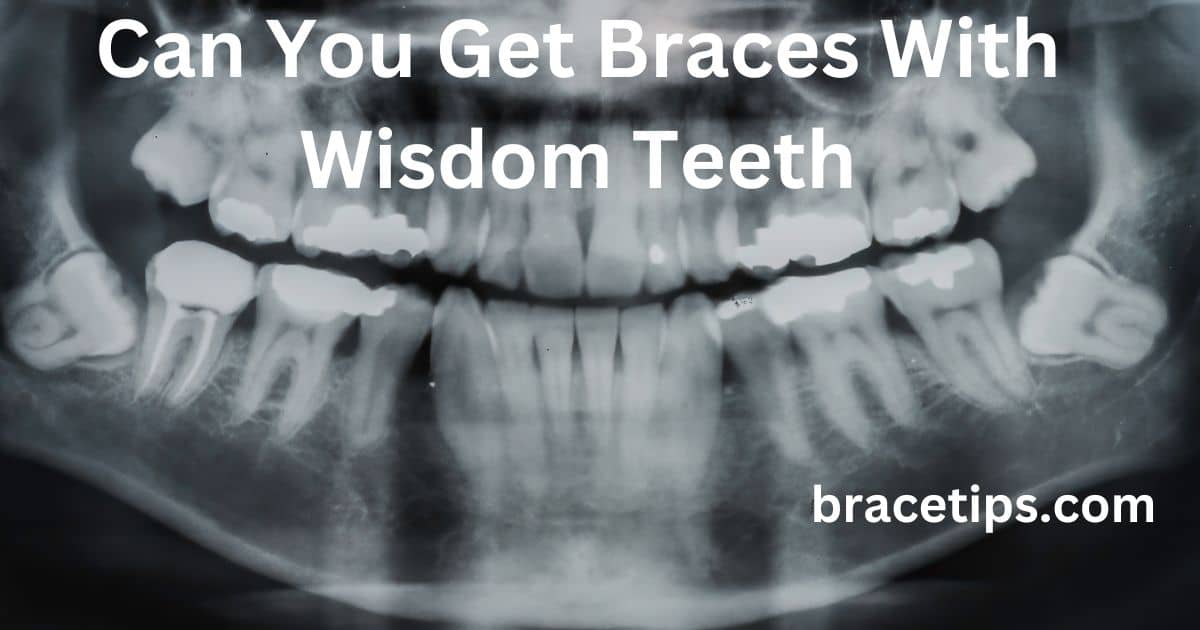Can You Get Braces With Wisdom Teeth
Orthodontic treatments, specifically braces, have become a popular choice for individuals seeking to enhance their smiles and correct dental misalignments. On the other hand, wisdom teeth, the third set of molars that typically emerge in the late teens or early twenties, can pose unique challenges. This raises a common question: Can you get braces with wisdom teeth? The interplay between wisdom teeth and braces is a topic of concern and curiosity for many. As individuals embark on their orthodontic journey with braces, questions often arise about the compatibility of these two dental phenomena. This comprehensive article delves into the intricacies of wisdom teeth and braces, addressing common queries and shedding light on their potential impact.
What Are Wisdom Teeth?
Wisdom teeth, scientifically termed third molars, are the last set of molars that typically emerge at the back of the mouth. They usually make their debut between the ages of 17 and 25, a period often referred to as the “age of wisdom.” While some individuals may experience a seamless eruption, others may encounter complications, leading to various dental issues.
Potential Problems With Wisdom Teeth
The eruption of wisdom teeth can be accompanied by a host of problems. These issues include impaction, crowding, and the potential misalignment of surrounding teeth. The mere presence of wisdom teeth can trigger discomfort, pain, and, in some cases, infections. Understanding these potential problems is crucial for individuals navigating their orthodontic journey.
Will Braces Affect My Wisdom Teeth?
One common concern among those considering braces is whether the orthodontic treatment will impact the development and positioning of wisdom teeth. Addressing this concern requires a nuanced understanding of how braces function and their potential influence on the emerging third molars.
The MECE Principle: Clearing the Confusion
The MECE (Mutually Exclusive, Collectively Exhaustive) principle is instrumental in dissecting this multifaceted concern. Braces primarily focus on aligning existing teeth, exerting controlled pressure to guide them into the desired position. However, braces do not directly influence the eruption or growth of wisdom teeth. They operate in a distinct realm, ensuring the alignment of the existing dental structure.
Relationship Between Wisdom Teeth and Braces
Challenges of Wisdom Teeth
Wisdom teeth, also known as third molars, often emerge when there is limited space in the jaw. This can lead to various issues, including crowding, misalignment, and potential discomfort. Understanding the relationship between wisdom teeth and braces is crucial for anyone considering orthodontic treatment.
Impact on Orthodontic Treatment
The presence of wisdom teeth can complicate orthodontic procedures. These molars might hinder the effectiveness of braces, affecting the desired outcomes. Orthodontists carefully assess each case to determine the best course of action.
Common Concerns
Many individuals express concerns about the feasibility of getting braces with wisdom teeth. Common worries include the potential for increased pain, prolonged treatment duration, and compromised results. Addressing these concerns requires a personalized approach and consultation with an orthodontic professional.
Consultation with Orthodontist
Before making any decisions, it’s essential to consult with an experienced orthodontist. They will evaluate the unique aspects of your dental structure, including the presence and condition of wisdom teeth. Based on this assessment, they can provide tailored recommendations for orthodontic treatment.
Wisdom Teeth Removal Before Braces
Procedure and Importance
In some cases, orthodontists may recommend removing wisdom teeth before starting braces treatment. This preemptive approach aims to create an optimal environment for successful orthodontic treatment.
Recovery Process
Understanding the recovery process is crucial for individuals considering wisdom teeth removal. While recovery times vary, following post-operative instructions diligently contributes to a smoother healing process. Orthodontists guide patients through this phase, ensuring minimal disruption to their daily lives.
Braces with Existing Wisdom Teeth
Orthodontic Solutions
For individuals with existing wisdom teeth, orthodontists explore alternative solutions to achieve desired results. Customized treatment plans may involve adjustments to accommodate the presence of wisdom teeth, such as strategic bracket placement and specialized alignment techniques.
Monitoring Wisdom Teeth During Treatment
Orthodontic professionals closely monitor the impact of braces on wisdom teeth throughout the treatment. Regular check-ups enable timely adjustments, ensuring that any emerging issues are promptly addressed. This proactive approach enhances the overall success of orthodontic treatment.
Managing Discomfort
Pain Management Strategies
Patients often express concerns about potential discomfort associated with both braces and wisdom teeth. Orthodontists employ various pain management strategies, including the use of orthodontic wax, over-the-counter pain relievers, and adjustments to alleviate pressure points.
Adjustments to Orthodontic Treatment
In cases where discomfort persists, orthodontists may make necessary adjustments to the braces. This may involve modifying the treatment plan, addressing specific issues causing discomfort, and ensuring a more comfortable orthodontic experience.
Success Stories
Patient Experiences
Numerous individuals have successfully undergone orthodontic treatment with wisdom teeth in place. Sharing patient experiences can provide valuable insights into the real-world outcomes of combining braces with existing wisdom teeth. Positive stories inspire confidence and dispel common concerns.
Positive Outcomes
Orthodontic success is achievable with proper planning and execution. Experienced orthodontists can navigate the complexities of braces and wisdom teeth, guiding patients towards positive outcomes and transformative smiles.
Alternatives to Braces with Wisdom Teeth
Invisalign and Other Options
In certain cases, alternatives to traditional braces, such as Invisalign, may be considered. These options provide discreet and removable orthodontic solutions that can be compatible with the presence of wisdom teeth. Exploring alternatives allows individuals to make informed choices based on their preferences and lifestyle.
Pros and Cons
Understanding the pros and cons of different orthodontic options helps individuals weigh their choices effectively. Factors such as treatment duration, visibility, and maintenance requirements play a crucial role in the decision-making process.
Wisdom Teeth and Oral Health
Impact on Overall Oral Health
Beyond orthodontic considerations, wisdom teeth can impact overall oral health. Regular dental check-ups are essential for monitoring the health of wisdom teeth and addressing any emerging issues promptly. Maintaining optimal oral hygiene practices is crucial for long-term dental wellness.
Regular Dental Check-ups
Routine dental check-ups provide opportunities for early detection of potential issues related to wisdom teeth. Orthodontists and dentists collaborate to ensure comprehensive oral care, addressing both alignment concerns and general dental health.
Orthodontic Advancements
Modern Techniques
Advancements in orthodontic techniques contribute to more efficient and comfortable treatments. These innovations accommodate various dental conditions, including the presence of wisdom teeth. Staying informed about these advancements empowers individuals to make well-informed decisions regarding their orthodontic journey.
Compatibility with Wisdom Teeth
Modern orthodontic practices are designed to be compatible with the complexities of individual cases, including the presence of wisdom teeth. Orthodontists leverage advanced technologies and techniques to optimize treatment outcomes while addressing specific challenges posed by wisdom teeth.
Debunking Common Beliefs
Myths and misconceptions often surround the combination of braces and wisdom teeth. Addressing common beliefs, such as the inevitability of pain or extended treatment duration, helps individuals approach orthodontic care with accurate information. Evidence-based insights dispel unfounded fears.
Evidence-Based Information
Orthodontic decisions should be based on evidence and professional guidance. Accessing reliable information from reputable sources and consulting with experienced orthodontists ensure that individuals make decisions aligned with their specific needs and expectations.
Expert Opinions
Orthodontists’ Perspectives
Orthodontists play a crucial role in guiding individuals through the decision-making process. Their expertise provides valuable perspectives on the feasibility of getting braces with wisdom teeth. Consulting with multiple orthodontists allows individuals to gather diverse insights and make informed choices.
Considerations for Individual Cases
Each dental case is unique, and orthodontic decisions should be tailored to individual needs. Factors such as the position, condition, and impact of wisdom teeth vary among individuals. Customizing orthodontic treatments ensures that the chosen approach aligns with specific requirements.
Patient Education
Understanding the Process
Educating patients about the orthodontic process fosters informed decision-making. Providing detailed information about the treatment plan, potential challenges, and expected outcomes empowers individuals to actively participate in their orthodontic journey.
Informed Decision-Making
Informed decision-making involves weighing options, understanding potential outcomes, and aligning choices with personal preferences. Orthodontists support patients in making decisions that resonate with their goals, preferences, and lifestyle.
Wisdom Teeth and Braces
Navigating the terrain of orthodontics with the simultaneous presence of wisdom teeth requires a strategic approach. Orthodontists meticulously evaluate the unique dental landscape of each individual to devise a customized treatment plan that addresses both alignment issues and potential wisdom tooth complications.
Can Wisdom Teeth Shift Your Teeth?
The emergence of wisdom teeth can indeed exert pressure on the surrounding teeth, leading to shifts and misalignments. Understanding the dynamic interplay between wisdom teeth and orthodontic interventions is crucial for achieving optimal results.
What Can Wisdom Teeth Do to Your Smile?
The impact of wisdom teeth on your smile goes beyond mere aesthetics. Misaligned or crowded teeth can affect your bite, speech, and overall oral health. Orthodontic treatments, including braces, aim to enhance not only the appearance of your smile but also its functionality.
What Are Impacted Wisdom Teeth?
Impacted wisdom teeth occur when the molars do not fully emerge or grow at an angle. This can lead to a range of complications, including pain, swelling, and infection. The risk of impacted wisdom teeth underscores the importance of proactive dental care and regular monitoring by orthodontic professionals.
FAQ Section
Q: What are the risks of getting braces with wisdom teeth?
A: The risks vary based on individual cases, but orthodontists assess and manage potential challenges to minimize risks effectively.
Q: Can braces cause issues with impacted wisdom teeth?
A: While braces can pose challenges with impacted wisdom teeth, orthodontic professionals tailor treatment plans to address specific issues and ensure optimal outcomes.
Q: Is wisdom teeth removal mandatory before getting braces?
A: Wisdom teeth removal is not mandatory for everyone. Orthodontists evaluate each case individually to determine the most suitable approach.
Q: Are there alternatives to traditional braces with wisdom teeth?
A:Yes, alternatives such as Invisalign provide discreet options that may be compatible with the presence of wisdom teeth.
Conclusion
In the dynamic interplay between braces and wisdom teeth, informed decision-making is paramount. While the presence of wisdom teeth introduces unique considerations, orthodontic advancements and personalized approaches ensure successful outcomes. Whether opting for wisdom teeth removal before braces or exploring alternative orthodontic solutions, individuals can achieve transformative smiles with proper guidance and care. Their impact on orthodontic treatments, and the significance of timely removal empowers individuals to embark on their orthodontic journey with confidence. The collaboration between patients and orthodontic professionals ensures not only a dazzling smile but also optimal oral health for years to come.

